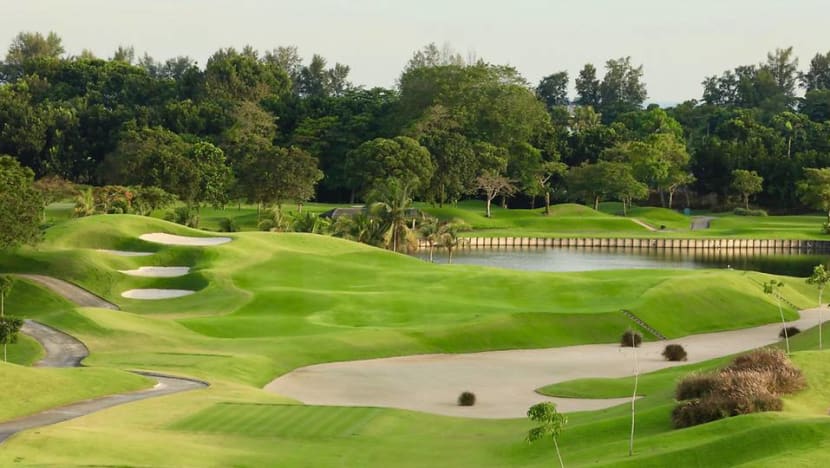Country clubs in Singapore seek to refresh offerings as youths lose interest in prestige factor
With recent news that the government will take back the land currently occupied by Raffles Town Club in 2026, CNA looks at what country clubs – once coveted by Singaporeans as part of the 5Cs – as well as social clubs are doing to hold onto and woo members.

This audio is AI-generated.
SINGAPORE: When Mr James Sundram first entered the workforce in the 80s, being a country club member was all the rage – and the best way to build business relationships.
“You get into the glam and the glory of those things … That was my best sort of networking - playing golf, inviting people to a nice country club. I didn’t have many alternatives,” the 59-year-old told CNA.
That has since changed for the younger generation. None of Mr Sundram’s children are willing to take over his Laguna National Golf Resort Club membership.
Nowadays, the semi-retired investor more frequently patronises Singapore Cricket Club – one of the nation’s oldest social clubs – for its convenient location at the Padang and continued prestige, among other reasons.
Laguna’s exclusivity has disappeared since he first joined it, he said, and he recently decided to let go of his membership there.
Once perceived as prestigious status symbols, such clubs have fallen out of favour with younger Singaporeans, many of whom reject the 5Cs – cash, car, credit card, condominium, and country club membership – that used to form the basis of many people’s aspirations and goals.
Land lease expiry is also a problem that country clubs and social clubs have to grapple with.
On Nov 20, Raffles Town Club was dealt a blow when the government announced it will take back the land currently occupied by the social club when its lease expires in October 2026. It remains to be seen if the club will find another location or shut its doors.
Already, two country clubs in Singapore – Raffles Country Club and Jurong Country Club – had to close down in the past decade when the government acquired the land they sat on.
"HOME AWAY FROM HOME"
While land lease expiry is an unavoidable issue, some country and social clubs told CNA that they are attempting to tackle the fall in interest in memberships by refreshing their offerings and facilities.
Country clubs typically differ from social clubs by having golf courses, though both offer recreational sports as well as amenities for dining and entertaining.
Spokespeople from Singapore Island Country Club (SICC) and Singapore Recreation Club (SRC) brought up the importance of creating a “home away from home”.
SRC’s general manager Desmond Tay pointed out that joining clubs in Singapore used to hold significant prestige, but younger Singaporeans now prefer clubs that “seamlessly blend uniqueness with familiarity”.
Clubs must now adapt by offering distinctive features and creating a sense of belonging that goes beyond the traditional notions of prestige and status, said Mr Tay, who is also president of the Club Managers’ Association.
“While social networking remains essential, modern clubs must transcend this, aiming for more profound engagements and connections with their members,” he added.
To that end, the social club – which recently secured a new 30-year lease at the Padang – is revitalising its building facade and building new amenities to better serve younger generations, including a co-working space. It currently has close to 7,000 active members.
SRC has also introduced a pickleball section, which Mr Tay said has attracted “a wave of new members”, and brought renowned chefs Justin Quek and Chan Kwok into its fold.
A spokesperson from SICC, which has one of the largest club memberships in Singapore with around 18,000 members, said that club members are often “creatures of habit” who want to feel safe and secure.
Redesign work on SICC’s Island golf course began in September, while the club recently opened a clubhouse at its Bukit location that includes a virtual reality room and upgraded tennis courts.
“Clubs need to create a point of difference to distinguish themselves from the competition. It is also important to upkeep the facilities and rejuvenate the offerings, so members feel proud to host and socialise there,” said the SICC spokesperson.
Meanwhile, Singapore Swimming Club’s general manager Kok Min Yee said it holds open houses and works with niche media outlets to raise its public profile. The social and sports club also opened a new facility earlier this year with a multi-purpose futsal pitch and multi-purpose nets for cricket and archery, he added.
The club has around 16,000 members. Mr Kok said there would “always be a place for exclusive private clubs” where families can bond and members can meet other like-minded people.
Nevertheless, experts noted how the changing housing landscape in Singapore has led to more condominiums with recreational amenities similar to those offered by clubs.
Assistant Professor Charlene Chen, a social and consumer psychologist from Nanyang Technological University, said people nowadays have alternative access to amenities like swimming pools, gyms and tennis courts.
“Country clubs are definitely less coveted in today’s environment. There are other social clubs that have emerged,” she added.
Offering a particular type of social network that people desire, as well as providing special experiences that people typically cannot get, will help clubs to attract new members and retain them, noted Asst Prof Chen.
She cited the Mandala Club – a private members’ club that launched in 2021 – as an example.
“Clubs like these market themselves using the concepts of exclusivity and social connection, and regularly organise activities that allow members to network and get access to unique experiences,” she said.
“For example, they bring in famous chefs from other parts of the world and arrange meetings with industry gurus.”
SRC’s Mr Tay said that people now are looking more at diverse lifestyle and sport- and family-oriented activities as well.
CLUB FOR FAMILY
Indeed, for club members like Mr Windsor Chan, a family-oriented atmosphere has motivated them to hold onto their membership.
The 53-year-old has been a member of the Chinese Swimming Club since 1991, as well as a member of Raffles Town Club since it opened in 2000.
“I favour the CSC model because … basically, they have positioned themselves as a second home,” he said. “I can actually come to the club, use the co-working space and the cafes that we have down there to do work.”
The social club, which started in 1905 and currently has close to 9,000 principal members, announced on Monday (Nov 27) that it has successfully negotiated a 30-year lease renewal for its sports complex along Amber Road.
Mr Chan said he thought that the club had “done an excellent job reinventing themselves so they are fit for my purpose and my children”. Its co-working space opened early last year.
“Lately, I’m also very happy that they have also branched into corporate social responsibility – giving back to society,” Mr Chan added. His son Tedd, who swims competitively, was recently asked by the club to volunteer to teach some underprivileged children how to swim.
MEMBERSHIP PRICES
On the other hand, Mr Chan said he is trying to sell his Raffles Town Club membership but is not hopeful with prices dropping “like crazy”.
Memberships listed for sale on e-commerce platform Carousell currently range from as low as S$1,000 to S$8,000, while other Raffles Town Club members previously told CNA that memberships cost around S$25,000 to S$30,000 when it was first launched.
Prices at other clubs differ depending on the type of membership and club, as well as whether the club’s land lease is about to expire with any indication of whether it will be renewed.
The Business Times reported that membership at SRC is currently priced around S$8,500, while membership at Singapore Cricket Club costs S$22,500.
The more premier country clubs continue to command much higher fees. According to golf membership consultancy firm Singgolf, membership prices at such clubs hit a record high last year, with some saying this was largely driven by an influx of foreign money.
As of December last year, Singaporeans and permanent residents had to fork out an eye-watering S$500,000 to become a member of Sentosa Golf Club, while locals had to pay S$300,000 for an SICC membership.
Mr Tay told CNA's Heart of the Matter podcast that both clubs can command such prices because their leases will not expire for another 17 years and they continue to attract an “elite community” who want to join for exclusivity.
“But how many in the population can afford this kind of high price?” he questioned. “Foreigners do play a big part in raising the prices these last few days at these golf country clubs.”
At the lower end, an individual membership at Orchid Country Club costs about S$30,000, while membership at Warren Golf and Country Club is priced around S$23,500. The leases for both clubs are due to expire in 2030.
Ultimately, country clubs and social clubs acknowledged that rejuvenation is key to retaining members and attracting new ones.
Mr Chan, the Chinese Swimming Club member, said there is still a place for clubs in Singapore that can “provide an integrated package” unlike other locations.
“I needed a place where I can have my children train competitively by renowned coaches … and I'd be able to have a safe place for them to roam around and to participate in other activities, and also for myself so that I can work there,” he added.
“I think it’s very hard to find that integrated facility in community areas.”
For Mr Sundram, the Singapore Cricket Club’s offerings and old-school charm still interest him. He has also made friends there and formed a routine of going there every week.
This will not be something that the younger generation like his children feel, he said.
“Why tie yourself down to one single place, same old menu, same old people, when you could broaden your scope?” he added.








a3bf.jpg)
